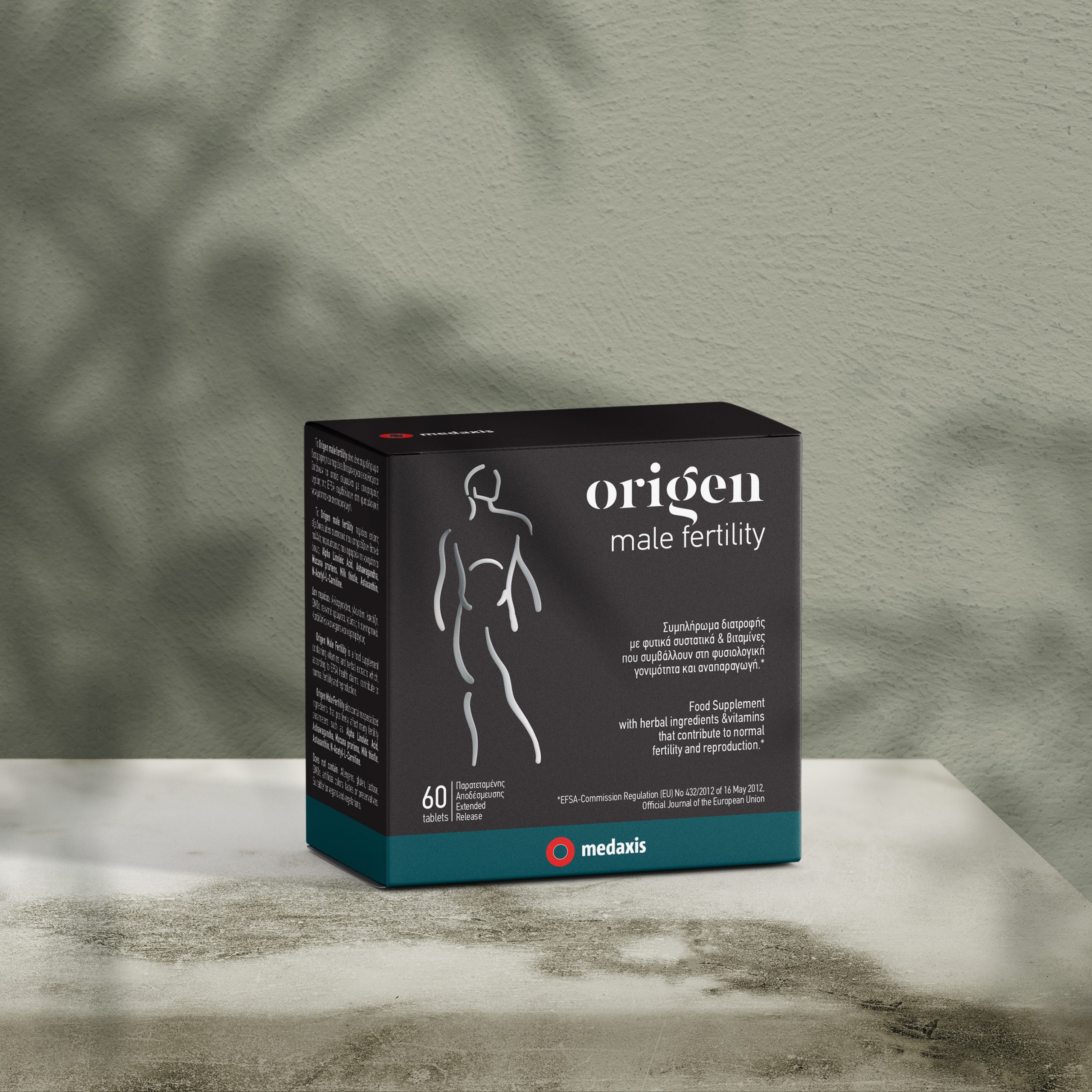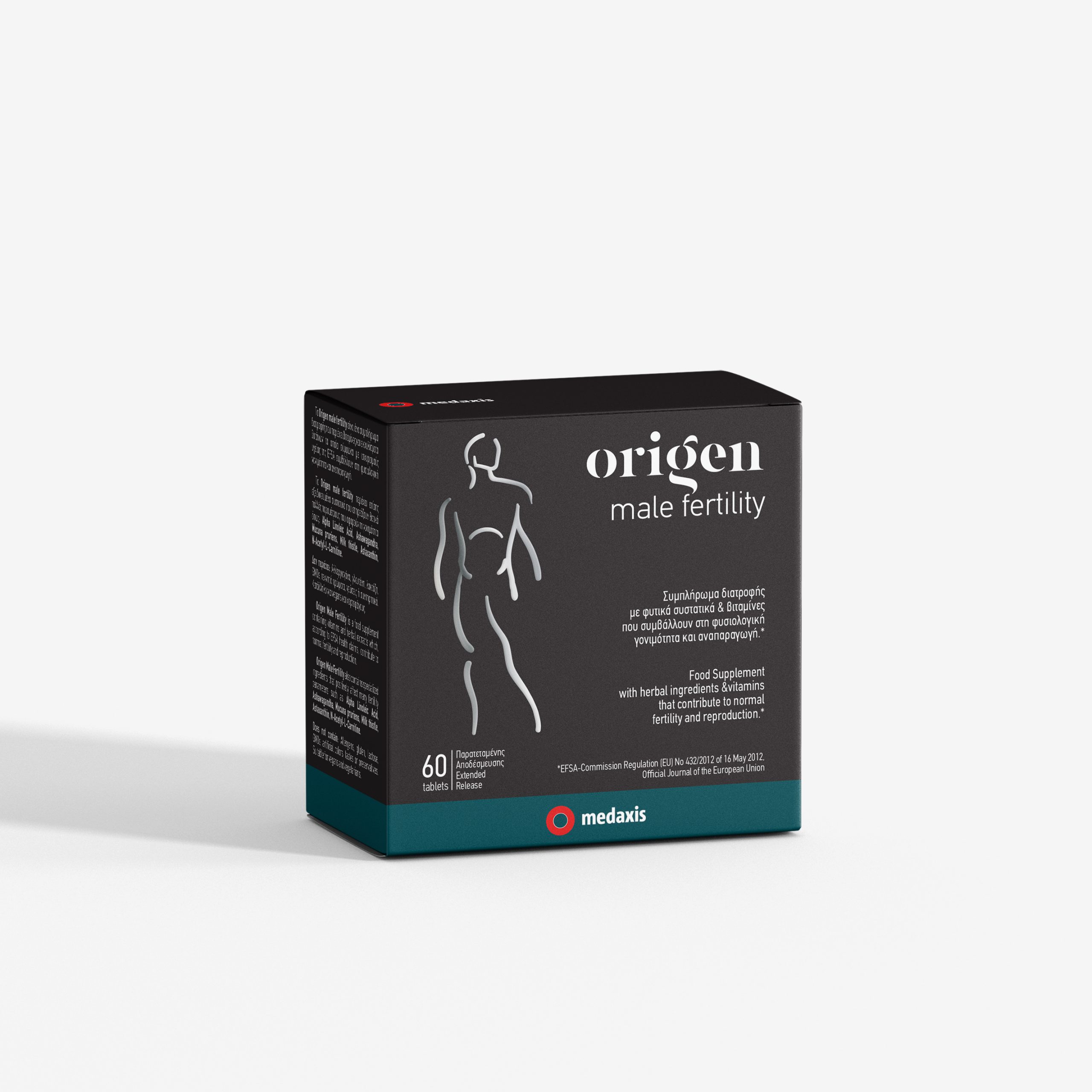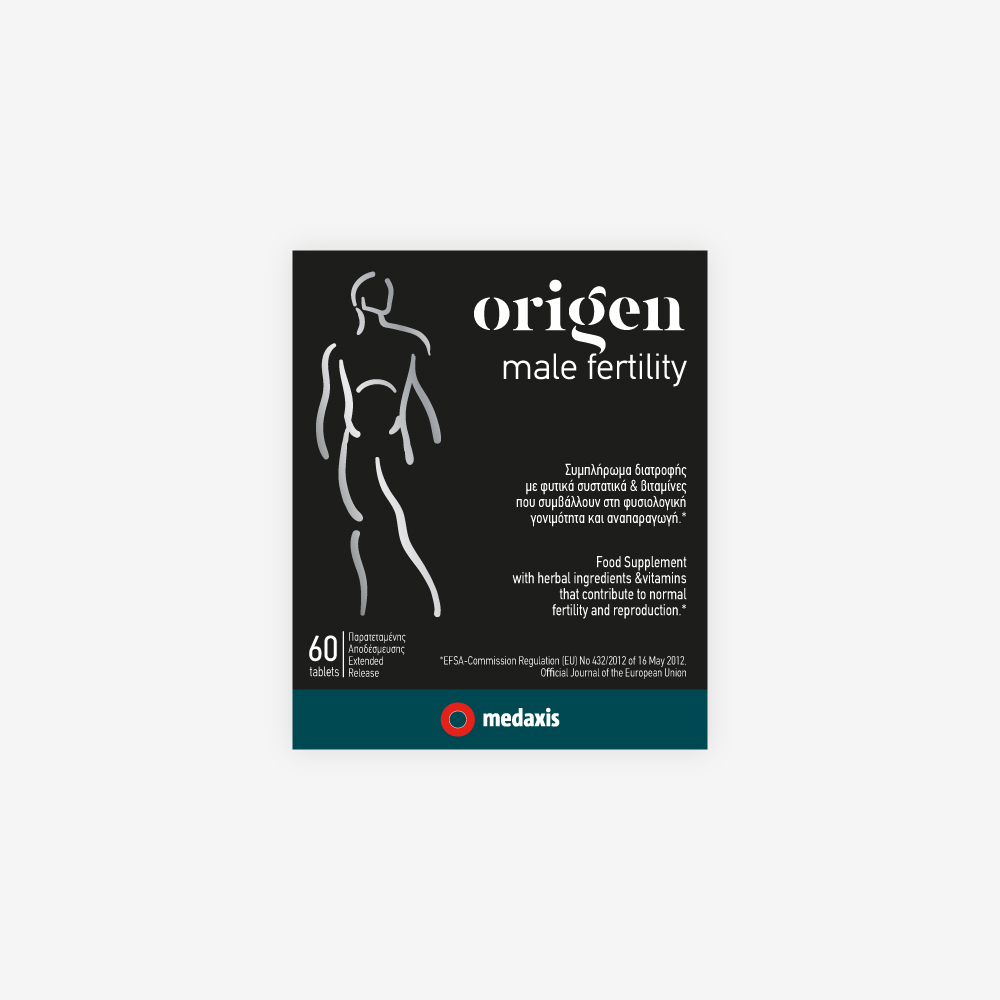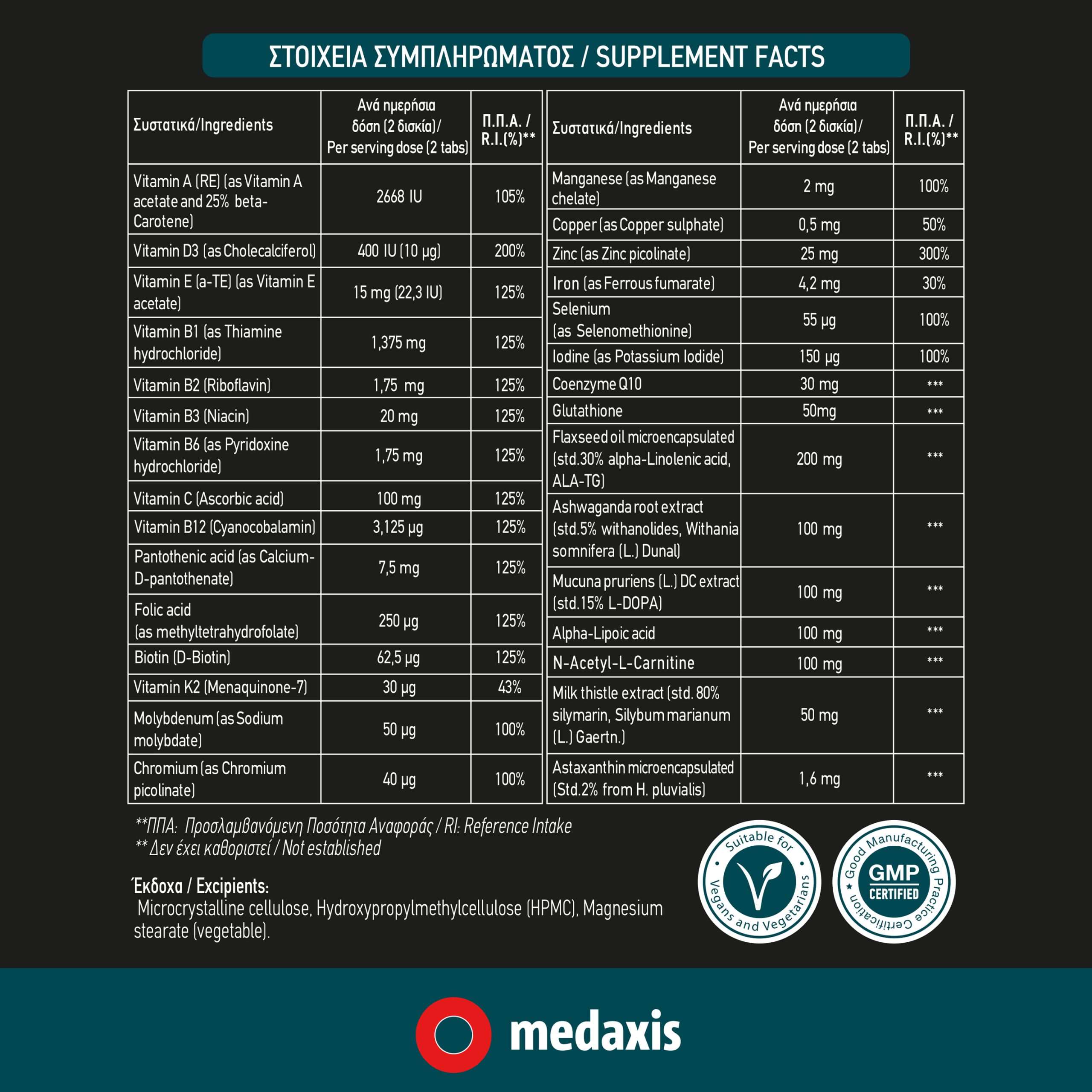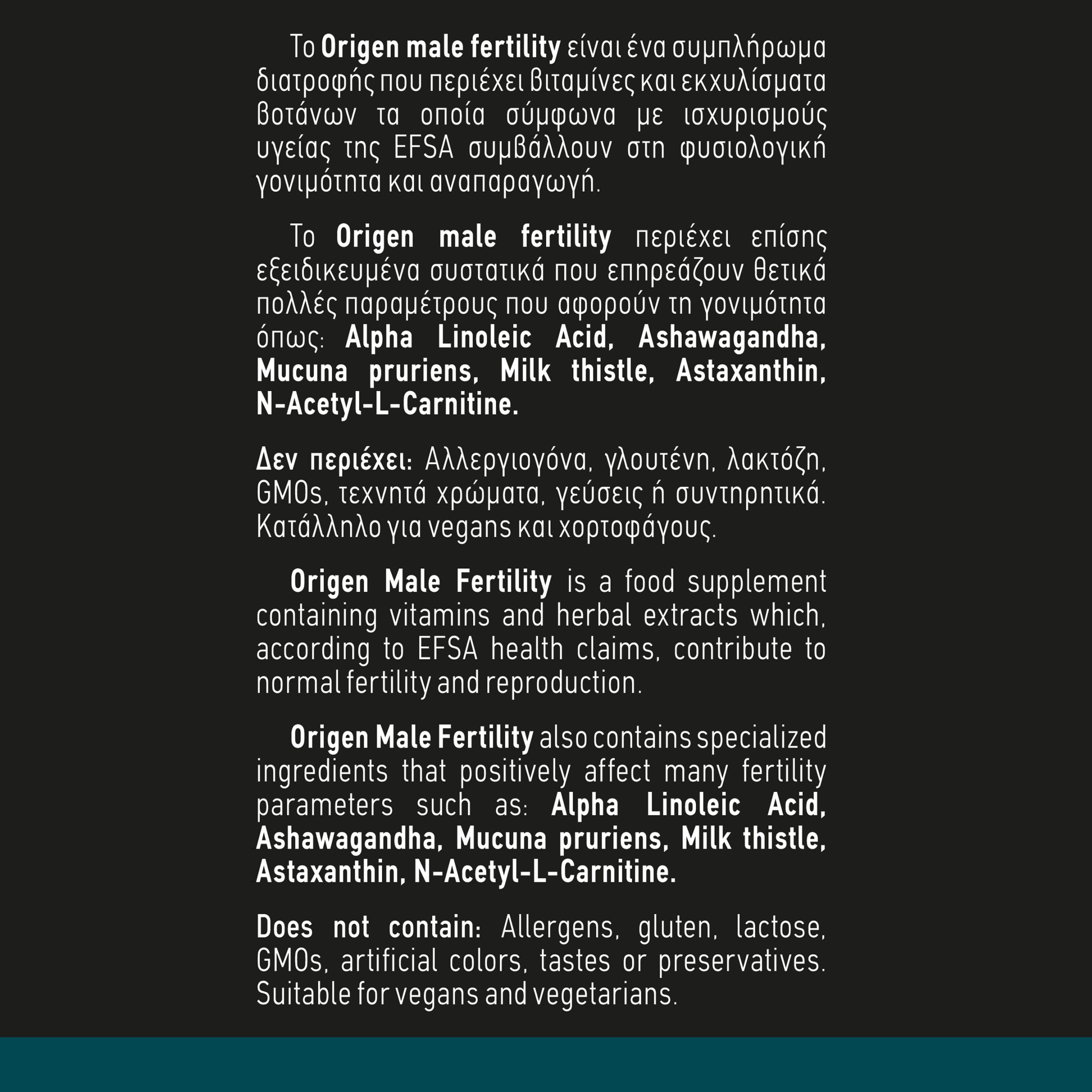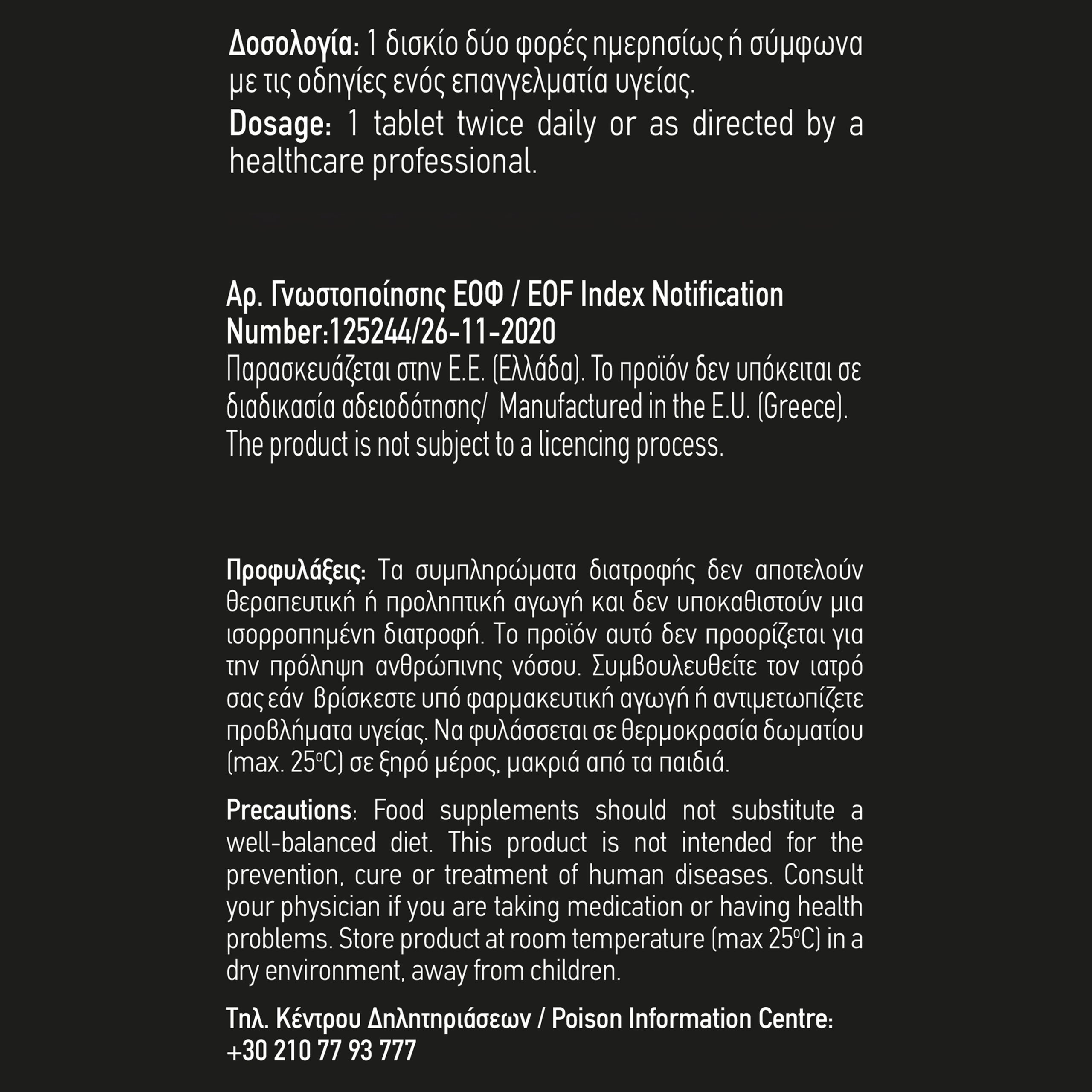Origen Male Fertility
Fertility and reproduction
- Selenium contributes to normal spermatogenesis.
- Zinc contributes to normal fertility and reproduction.
- Zinc helps maintain normal testosterone levels in the blood. Numerous scientific studies have shown the impressive results of zinc in improving the vitality, morphology and motility of sperm.
- In a group of men receiving Vitamin D, a significant increase in total testosterone, bioactive testosterone and free testosterone levels was achieved.
Protection of cells from oxidative stress
- Vitamin C, vitamin E, manganese, riboflavin, selenium, copper, zinc contribute to the protection of cells from oxidative stress. Oxidative stress is an important factor for fertility [4,5].
Energy production and reduction of fatigue
- Vitamins B2, B3, B5, B6, B12, C, magnesium and iron contribute to the normal function of metabolic processes aimed at producing energy and reducing fatigue.
- Iron contributes to the normal transport of oxygen to the body.
- Vitamin C increases the absorption of iron.
- Copper contributes to the normal transport of iron in the body.
Immune function
- Vitamins A, B6, B12, C, D, selenium, iron, folic acid, copper and zinc contribute to the normal function of the immune system.
Claims that reinforce the nutritional goal of Origen male fertility
- Zinc contributes to normal DNA synthesis.
- Vitamin A has a role in the process of cell specialization.
- Vitamin B6 contributes to the regulation of hormonal activity.
- Pantothenic acid contributes to normal synthesis and metabolism of steroid hormones, vitamin D and some neurotransmitters.
- Thiamine contributes to the normal function of the heart.
Claims of clinical studies regarding ingredients in Origen male fertility associated with imporved fertility [7-31].
Omega-3 fatty acids are essential for the proper function of spermatozoa. The mebrane of normal spermatozoa contains omega-3 polyunsaturated fatty acids. Long chain DHA and EPA (fish oil omega-3) can not cross the blood-testicular barrier due to their high molecular weight, while the ALA (flaxseed oil omega-3) short chain passes through and is converted to DHA. It is therefore important that men ensure the daily intake of omega-3 fatty acids from dietary supplements.
Origen Male Fertility also contains specialized ingredients that positively affect many fertility parameters such as: Alpha Linoleic Acid, Ashwaganda, Mucuna pruriens, Milk thistle, Astaxanthin, N-Acetyl L-carnitine.
Alpha Linoleic Acid from flaxseed oil is an essential omega-3 fatty acid. It is called “essential” because it is necessary for normal human development. Alpha-linolenic acid is thought to reduce the risk of heart disease by helping to maintain a normal heart rate.
Why a-linoleic acid?
Omega-3 fatty acids are essential for the proper function of sperm. The membrane of normal sperm contains omega-3 polyunsaturated fatty acids (PUFAs) of long chain in high concentration, namely icosahedral hexaenoic acid (DHA), which ensures high fluidity in the membrane phospholipids. The cell membrane of sperm with infertility contains less DHA and shows lower fluidity. As a result of the reduced fluidity of the membrane, the ability of the sperm to fuse with the oocytes decreases, which explains the reduced ability to fertilize. However, sperm concentration and motility were inversely correlated with dietary intake of long-chain PUFAs EPA and DHA, but were positively correlated with omega-3 PUFA a-linolenic acid (ALA) short-chain intake. This is because long-chain DHA and EPA cannot cross the blood-testicular barrier due to their high molecular weight, while the short-chain ALA can. Due to the abundant presence of the necessary enzymes in the seminal vesicles, ALA is metabolized to long-chain PUFAs. It acts synergistically with Alpha Lipoic acid.
Alpha Lipoic Acid (Alpha Lipoic Acid)
is an organic compound found in all human cells. It is well known for its strong antioxidant properties. Alpha-lipoic acid is both water- and fat-soluble, which allows it to function in any cell or tissue in the body. The antioxidant properties of alphalipoic acid have been linked to many benefits, including lower blood sugar levels, reduced inflammation, slower skin aging and improved nerve function. Humans only produce alpha-lipoic acid in small quantities.
Glutathione (GSH)
is also a very powerful antioxidant. It has a huge ability to fight oxidative stress and neutralize harmful free radicals. Chemically, glutathione is a tripeptide that consists of 3 amino acids: Glutamic acid, Cysteine and Glycine. The body uses glutamic acid to produce glutamine. When these three amino acids are combined into glutathione, they gain the power to detoxify dangerous free radicals, toxic drugs and heavy metals. This mechanism protects the whole body from dysfunction and disease.
The effect of Ashwagandha on sperm quality and stress reduction
Ashwagandha is commonly used for anxiety. It is an “adaptogen” ingredient that helps balance the body’s response to stress. It increases the body’s ability to resist physical, chemical or biological factors and therefore enhances the normal smooth response to stress. Studies support a significant effect of Ashwagandha for this purpose and it seems to reduce cortisol levels. Ashwagandha can also reduce insomnia, fatigue and depressive symptoms. In addition, it can increase the quality of testosterone and sperm in infertile men. A study of the spermatogenic effect of Ashwagandha root extract (Withania somnifera) in men with oligospermia showed a 167% increase in sperm count, a 53% increase in sperm volume, a 57% increase in sperm motility and a 17% increase in testosterone levels 90 days after starting treatment. Clinical studies in men and women with chronic stress show that Ashwagandha reduces stress levels after 30 days of administration and even more after 60 days of administration.
Mucuna pruriens, the adaptogen with an effect on fertility
The antioxidant action of Astaxanthin
Milk thistle, for detoxification and liver protection
Milk Thistle (Silybum marianum) is a perennial herb whose seeds contain silymarin, a group of compounds reported to have antioxidant and anti-inflammatory affects. Milk thistle has been used traditionally to treat liver and gallbladder disorders, including hepatitis, cirrhosis and jaundice. Today, milk thistle is mainly recognized as a therapeutic and hepatoprotective agent, especially in cases of cirrhosis, chronic hepatitis, alcohol consumption and exposure to environmental toxins. There is evidence that milk thistle is hepatoprotective, through antioxidant activity, blockade of toxins at the membrane level, increased protein synthesis, anti-inflammatory action and possible immunomodulatory affect. The elimination of toxins from the liver and the regulation of metabolism, positively affects male fertility.
In addition, Origen male fertility contains N-Acetyl L-carnitine (NAC). In the body, acetyl-L-carnitine is produced from L-carnitine. L-carnitine is a derivative of an amino acid. L-carnitine and acetyl-L-carnitine are used to help the body convert fat into energy. Administration of carnitine to patients with weak sperm improves many parameters of the sperm, such as concentration, number, motility and morphology of the sperm. L-acetylcarnitine, in fact, has better results in increasing sperm motility than L-carnitine.

